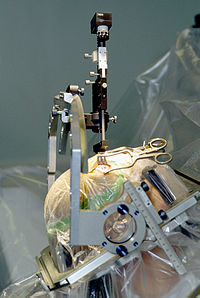
Photo from wikipedia
BACKGROUND/PURPOSE To implement resident curriculum in France based on theoretical teaching and bed side training, the national council known as the "Collège Hospitalier et Universitaire de Chirurgie Pédiatrique" examined the… Click to show full abstract
BACKGROUND/PURPOSE To implement resident curriculum in France based on theoretical teaching and bed side training, the national council known as the "Collège Hospitalier et Universitaire de Chirurgie Pédiatrique" examined the relevance and feasibility of systematically introducing simulation program in the pediatric surgery resident training. MATERIAL AND METHODS A national simulation training program was developed and took place in a 2-day session organized in 7 simulation centers in France. The program included technical (laparoscopic/suturing technique on low-fidelity models) and nontechnical (6 scenarios for standardized consultation, and a team work scenario based on errors prevention in the operative room) skills. Evaluation of the program (Likert scale from 1 (bad) to 5 (excellent) and notation on 20 points) concerned trainees and trainers. RESULTS 40 residents (95% of all pediatric surgery French residents) attended with a ratio of trainees/trainer of ½. The training objectives earned a score of 4.46/5. The pedagogical value of the seminar scored 4.7/5, teaching quality 17.95/20, and the overall seminar score was 17.35/20. CONCLUSION This program, unique nationally, was assessed very favorably by the participating residents and by the involved trainers. To our knowledge, it represents the first mandatory national simulation training program included within a surgical training model. LEVEL OF EVIDENCE Level IV.
Journal Title: Journal of pediatric surgery
Year Published: 2019
Link to full text (if available)
Share on Social Media: Sign Up to like & get
recommendations!